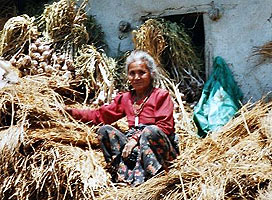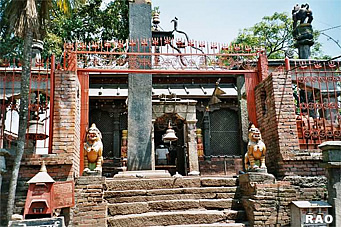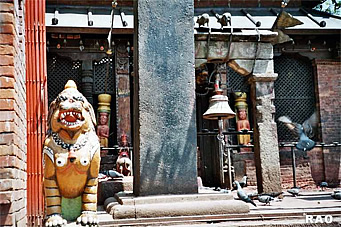|
About
the Culture & the People |
|
About
the People's Culture and Religion |
As
a brief intoduction to our chart of ethnic groups which follows this section,
we are giving you a simple outline of the major religious beliefs.
These
are not divisions amongst the hill and mountain people because sometimes
the religion followed by a specific ethnic group will be a mixture of all
major beliefs rather than following one particular code.
The
Hindus are great followers of Lord Shiva. The favourite female
goddess is Durga or Kali, an avatar of the consort of Shiva. The
greatest national festival dedicated to her is Dusserah, a ten day
celebration of her slaying of the demon Mahisesura.
 |
| This
festival is also a symbolic representation of the struggle in heaven which
corresponded to the epic battle in the Ramayana when Rana slew the Ravana.
Therefore, although Shiva as Pashupati - Lord of the Beasts,is the patron
god of Nepal, worship is often dlered to his female aspect Durga. These
gods are slayers of evil and many of the Hindus of Nepal are from martial
tribes. |
|
However, there is a gentler side to their faith in the veneration
of Vishnu.
The
former King of Nepal was believed to be a re-incarnation of Vishnu the Preserver. Vishnu has a vatars in Rama, Madhusudhan, Shyam,
Govinda, better known as Krishna - the lover of honey, stealer of
butter, pursuer of milkmaids and Lard of all Compassion or Buddha.
Do
we confuse you? A great belief in the Tantric arts explains the
Nepalese affiliation to female deities. As for the many aspects of a religious
faith that leads to a belief in re-incarnation into various other lives;
unless we have the good fortune to be spotless in this one; suffice it
to quote Lord Krishna himself who according to the Bhagsvad Gita said,
"I
know that many lives Arjuna you and I have lived. I remember all of them
and you none at all"
and,
"That
which men call a thousand names, the wise know as one".
Therefore
as you meet with our people and listen to their legends be tolerant of
their beliefs. They are in essence one with yours. The Buddhists of Nepal
are Mahayana Buddhists, followers of the Greater Vechicle. The mountain
people usually follow the practices of Lamaistic Tibet. The monks of Nepal
are usually of the Nyingmapa order which is the order which was
prevalent in Tibet before the great scholar and monk Tsong-Khapa brought in his reforms and founded the Gelugpa sect of monks, who
could neither leave their orders nor practise lamaism as married
lemas in-charge of a village.
|







